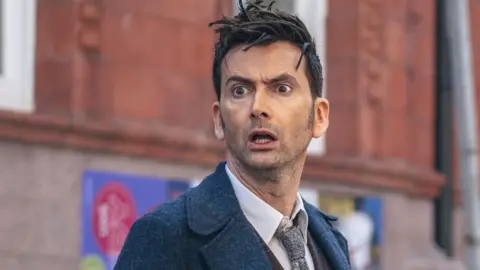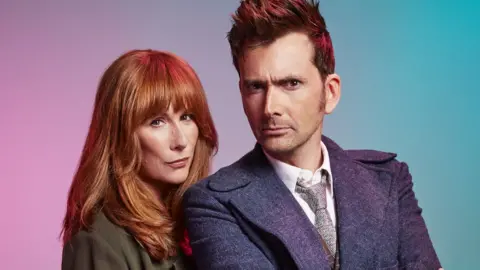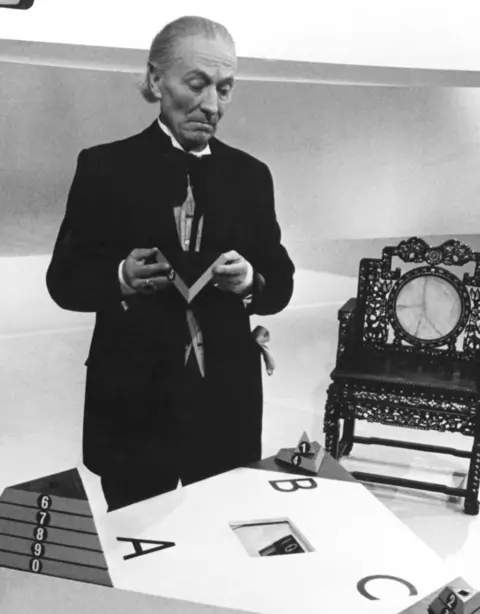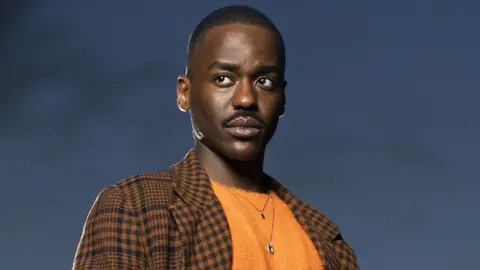Doctor Who: David Tennant says returning for 60th anniversary is 'a treat'
 BBC
BBCAt 5:15pm on 23 November 1963, the first episode of Doctor Who was broadcast on BBC One.
Exactly 60 years on, the show is celebrating its diamond anniversary with three new hour-long specials starting this weekend.
For many fans, they're particularly special because they feature the return of David Tennant, who left in 2010. His tenth Doctor has arguably been the most popular with audiences since the show returned in 2005.
"To get to return to something that meant so much 15 years ago, and was such a huge part of my life, was something I never really imagined was likely," says Tennant.
"To be the Doctor again, what a treat!"

He's joined once again on screen by Catherine Tate's Donna Noble. Viewers familiar with her storyline will know that the Doctor wiped her memory, warning her family that if she ever remembered him, she would die.
"Being back on set with Catherine of course, we had such a great time all those years ago," Tennant says.
She's not the only member of the old team to return, with Russell T Davies also back as head writer and showrunner.
"A lot of the team were back together," Tennent adds. "It felt very, very familiar."
Can lightning strike twice?
For many, Davies coming back to oversee the show was an even bigger surprise than Tennant's return.
Since leaving Doctor Who in 2010, he's written a variety of acclaimed dramas, most notably 2021's It's A Sin for Channel 4.
His previous time on Doctor Who was so successful - does he feel some nervousness because of the weight of such audience expectation?
"I know what you mean," Davies replies. "People said to me, can lightning strike twice? But actually, if you stand in the middle of a storm, and hold up a great big piece of metal, lightning does strike you twice.
"All this show needs is to be good, to be fun, to be well cast, to be exciting, to be brilliant. And that's really missing in the schedules, I think, at the moment.
"I dare not say I'm confident. But I'm proud of what we've done. And I hope it works."
"I hope it works" was the exact same thought that was in the minds of those making the show at the very start, six decades ago.

Waris Hussein directed Doctor Who's first ever episode An Unearthly Child.
"At the time we made the show, no-one knew what we had," he remembers, now aged 84. "I don't think we in the production area knew what we had, or indeed the BBC."
The young director only got assigned to the show by accident after the original director walked away.
"I got this script and I just didn't understand it at all. I said to Verity Lambert, the producer, 'What are we going to do with this?'
"She said, 'Well we're just going to have to make it work.' And that's where we are right now. We're still talking about something 60 years later because it worked!"
Doctor Who's longevity
The reasons for the show's longevity have been debated for decades. Those who have been involved in the show down the years have their own theories.
"They say there are only six or seven stories under sun," says Sylvester McCoy, who played the Doctor between 1987 and 1989. "And mankind's genius is to retell them and entertain us with them.
"This is one of those stories. Someone comes down to Earth, takes on the human form, and tries to do good and help out. And it is kind of a lonely figure, full of love for humanity."
Colin Baker, who played the Doctor between 1984 and 1986, concurs.
"It's all connected to the storytelling of 1,000 years ago," he says. "When people sat round a campfire and told tales of strangers who ride into town and makes things better. We've always loved that idea."
The future
While the anniversary will give fans a chance to celebrate the show's past, they will also be looking to its future.
Doctor Who has evolved significantly over the years. One recent development is the involvement of Disney, who will stream the show outside the UK and Ireland.
It means bigger budgets going forward. But is there a danger that if it becomes too slick and glossy, it might jeopardise the traditional British feel of the show?
"It's not a vast injection of cash," says Davies. "It's nothing like a Star Wars budget. But it's very healthy for Doctor Who. I think that's needed. I think the show's in danger of looking tired.
"We're in a huge streaming age, where these dramas look astonishing. And it reaches the point where you can't be charming, funny old Doctor Who any more."

After Tennant's three specials, there will be a new Doctor taking over the Tardis, played by Ncuti Gatwa.
Viewers will see him in action for his first full episode in the Christmas Day special, and the actor's first series will be broadcast in 2024. Davies is already overseeing filming on Gatwa's second series.
"I've had a little glimpse of what Ncuti can do, and it's very exciting," reveals Tennant. "He's so inventive, he's clever, he's quick, he's funny.
"It's really exciting that there's such a brilliant new Doctor coming down the track. And I will be glued to every new episode."
Doctor Who: The Star Beast is on BBC One on Saturday 25 November at 18:30 GMT.
